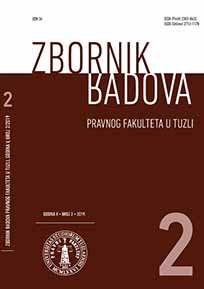TRGOVINA ISTOČNOJADRANSKIH GRADOVA U SVJETLU POVELJE KULINA BANA IZ 1189. GODINE
TRADE OF EASTERN ADRIATIC CITIES IN THE LIGHT OF THE 1189. KULIN CHARTER
Author(s): Vilma PezeljSubject(s): History of Law, Diplomatic history, Economic history, 6th to 12th Centuries, Commercial Law
Published by: Pravni fakultet Univerziteta u Tuzli
Keywords: rulers’ charters; trade; Dalmatian communes; Bosnia;the Middle Ages;
Summary/Abstract: The author analyzes the historical frame resulting in the 1189. Kulin Charter. Dubrovnik gained the freedom of trade in the Balkans’ hinterland as exemplared by the1186. contract between Dubrovnik and Nemanja, 1189. Kulin Charter and the 1192.privilege by the Byzantine Emperor Isaac Angelos allowing customs-free trade across the whole Byzantine Empire, with the obligation of supplying the Emperor with two armed galleons in case of a war against Venice or Zadar. In the same privilege,the Byzantine Emperor allowed Dubrovnik to salvage their ships and to retrieve the remains of their shipwrecks from the Byzantine territory, along with the goods that survived the shipwreck, which points to a close connection between maritime and overland trade. The issuing of privileges to Dubrovnik and other Dalmatian communes was carried forward likewise by other Bosnian rulers. Particularly important are the privileges issued to Split, especially in the 14.th century during the reigns of Hrvoje,the Herceg of Split, and Tvrtko I Kotromanović (1377.-1391.). The author analyzes significant terms appearing in maritime and overland trade (conserva, capitaneusturmae, average) and one of the more significant maritime contracts (rogantia).
Journal: Zbornik radova Pravnog fakulteta u Tuzli
- Issue Year: 5/2019
- Issue No: 2
- Page Range: 43-77
- Page Count: 35
- Language: Bosnian

